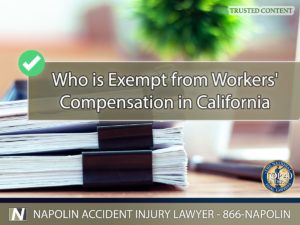Understanding Who is Exempt from Workers’ Compensation in California
Workers’ compensation in California is a mandatory system designed to provide financial and medical benefits to employees who suffer injuries or illnesses due to their job duties. This system is crucial because it offers support without the need for litigation, providing a quicker and less adversarial resolution to work-related injuries. However, certain categories of workers do not fall under this protection and understanding who is exempt is vital for both employers and employees. This article delves into the specifics of these exemptions, outlining the legal landscape and the implications for those not covered.
Understanding Workers’ Compensation in California
Workers’ compensation insurance is a form of employer liability insurance that covers medical costs and a portion of the wages for employees who get injured on the job. In California, this insurance is a legal requirement for all businesses with one or more employees. The system is based on a no-fault principle, meaning that employees receive benefits regardless of who was at fault for the injury. However, there are notable exceptions in the system, and not all workers qualify for these benefits.

Who is Exempt from California Workers’ Compensation?
Who is Exempt from California Workers’ Compensation?
The exemptions from workers’ compensation in California primarily concern the nature of the employment relationship and the role of the worker within a company. Independent contractors, certain business owners, and some volunteers are typically exempt from receiving workers’ compensation. The rationale behind these exemptions is often related to the control and independence exercised by the workers in their roles, or the temporary and voluntary nature of their work.
Self-Employed and Independent Contractors
Self-employed individuals and independent contractors are generally not covered by workers’ compensation because they are considered their own employers. To qualify as an independent contractor, a worker must pass specific criteria under California law, primarily revolving around their autonomy in performing tasks, the temporary nature of their work, and their provision of tools and methods without direct oversight.
Special Exemptions
Further exemptions apply to specific roles and industries. For example, certain sectors like technology and creative industries often use freelance or contract workers who are classified as independent contractors. Additionally, some agricultural laborers and seasonal workers may have different eligibility requirements or alternative systems in place that bypass traditional workers’ compensation.
Implications of Being Exempt
For workers exempt from workers’ compensation, the absence of this safety net can pose significant financial and health risks. Without coverage, injured workers may face high medical bills and lack income replacement during recovery. This lack of support can lead to severe economic hardship, especially if the injury results in long-term disability.

Navigating Claims as an Exempt Worker
Navigating Claims as an Exempt Worker
Exempt workers need to proactively manage their risk of workplace injuries. One approach is to secure private insurance or health coverage to compensate for potential work-related injuries. Additionally, understanding the legal rights and available remedies outside the workers’ compensation system is crucial. Legal consultation can provide guidance on how to navigate these complex scenarios and secure necessary support through alternative means.
Preventative Measures and Best Practices
Exempt workers are encouraged to adopt comprehensive safety measures and to negotiate contract terms that include provisions for injury liability and dispute resolution. Preventative strategies such as regular safety training, proper equipment, and clear contractual agreements regarding injury liability can significantly reduce the risk of workplace injuries and ensure better protection for workers.

Understanding Who is Exempt from Workers’ Compensation in California
Understanding Who is Exempt from Workers’ Compensation in California
Understanding the exemptions from workers’ compensation in California is crucial for ensuring that all workers are appropriately protected, either through the state system or alternative means. If you are unsure about your status or need advice on how to protect yourself from workplace injuries, reach out to Napolin Accident Injury Lawyer at (866)-NAPOLIN for a free consultation. With extensive experience across various compensation cases, our team is dedicated to providing the guidance and support you need to navigate these complex issues.
- Securing Justice for California Cyclists Hit by Car Doors - May 9, 2024
- Building a Robust Dog Bite Case in California - May 9, 2024
- Seeking Compensation for a Truck Accident in California - May 9, 2024
